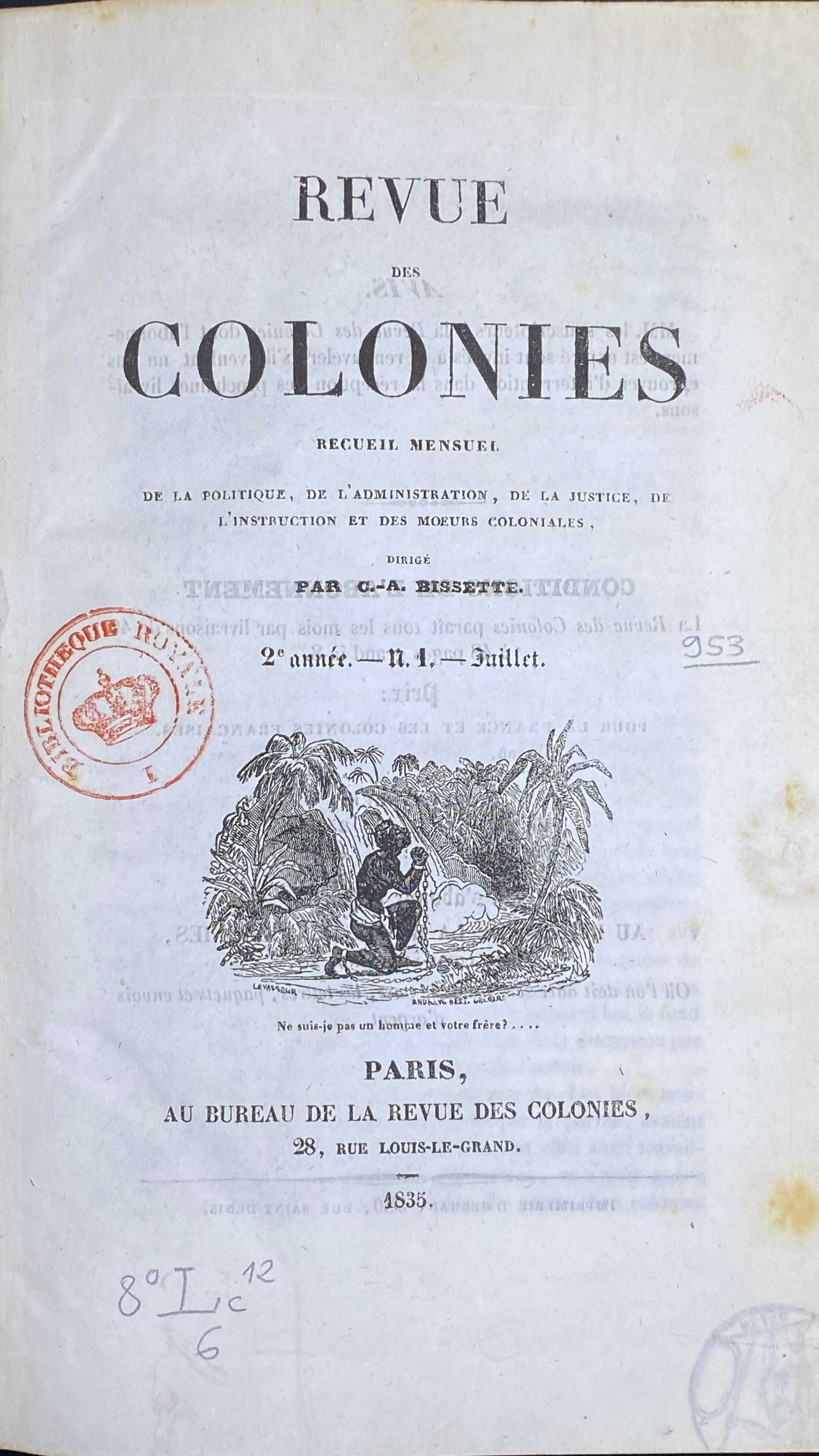About
Background
Founded in 1834 in Paris by Cyrille Bissette, a Martinican abolitionist, the Revue des Colonies, by its full title Monthly compendium of politics, administration, justice, instruction and colonial customs by a society of men of color, was the first periodical in France to be directed by people of color. The Revue was remarkable, furthermore, for its stated objective to amplify the struggles of disenfranchised people on a global scale and for its circulation spanning not only the territories of the French, British, and Spanish colonial empires but also the United States and Haiti.
Monthly issues, published with occasional hiatuses until 1842, offered readers a detailed inventory of current events, disseminated emancipatory petitions, denounced the abuses of colonial administrators and exposed the influence of enslavers over the French government, reflecting the editors’ personal struggle for the political recognition of free people of color. More radically, however, the Revue campaigned for immediate rather than gradual abolition years before members of the French Society for the Abolition of Slavery, including Victor Schoelcher, would adopt this position, thus altering the trajectory of the abolitionist movement in the period preceding France’s second abolition in 1848.
Taking after fashionable general interest periodicals, the Revue employed an array of innovative media strategies—serialized fictions, regular features, reviews, previews, advertisements, and collectible prints—to generate public interest in Black diasporic literature and culture and gave international prominence to Black writers and their allies by publishing essays, poems, and fictions by a vast network of correspondents. Little known today beyond a few reedited selections, the journal remains a fundamental source of insight into the complex relationships between colonial, national, and racial identities; the role of the periodical press as a vector for political and social change; and the formation of intellectual and political solidarities on a global scale over the first half of the nineteenth century.
Project goals
The purpose of this project is to preserve the legacy of this remarkable periodical by making it accessible to researchers, students, and interested members of the general public. The open-access bilingual digital edition and its accompanying critical apparatus aim to provide an authoritative text on the Revue, supported by robust scholarship in the range of academic disciplines its contents engage, including the history of transatlantic slavery and its abolition, French and wider European colonial history, international Black literature and culture, and the rise of the periodical press.
The edition's translations and annotations are the work of an international team of researchers, including leading experts in Caribbean studies, colonial history, nineteenth-century literatures and cultures, translation studies, and the history of print media.
Text encoding
The encoding of the text in TEI-XML is largely the work of graduate students under the supervision of project team members. This edition has been encoded according to the P5 Guidelines of the Text Encoding Initiative (TEI). Each issue and corresponding translation is transcribed into a TEI file. These files, along with the files related to the edition’s specific customization, can be accessed and downloaded by clicking the TEI icon at the bottom right-hand corner of the edition page.
User interface
The site, as it currently exists, is a prototype for the ongoing project, a space for experimenting with design and layout while regularly introducing more complex features and, crucially, collecting feedback from readers.
The interface and navigation functions aim to recreate contemporary reading practices, presenting the Revue less as a collection of archival documents and more as a periodical whose contents are organized, as they were for subscribers, through recurring headings reflecting its objectives and interests. Many of the editorial choices within the edition are motivated by considerations of accessibility. Spellings, for instance, appear modernized by default, though an option to view the text with original spellings (reflecting conventions predating widespread 1835 orthographic reforms) is available through the edition's interface. Each page can easily be switched between original French, modernized French, or English translation, with notes, including bibliographic references, available in either language. Images of the original issues can be accessed by clicking on the minimized bar indicating page changes.
Translation and critical apparatus
In translating the Revue into English, we have tried to preserve, to the highest degree possible, the positionality and often subtle political inflections of its language, as well as the original turns or phrase and syntactic structures, using contemporaneous English-language publications as models.
Notes fall into two overarching categories: reference notes corresponding to “named entities” in the site’s index, which appear at each first mention of a given individual, location, publication, or institution, and commentary notes, which offer context for specific passages or explain particular terms or allusions. The English version also includes translation notes aimed at clarifying the rhetorical choices and arguments that distinguish the Revue in the media landscape of its time.
Sources and partnerships
Unless otherwrise indicated, the digital images of the Revue visible on the site are sourced from the collections of the French National Library (BnF). We are immensely grateful to Gallica, the digital librarires of the BnF, for their support in digitizing and making available copies held in the Philosophy, History, Human Sciences department of the BnF.
The project has also received support from the Fondation pour la Mémoire de l’Esclavage (FME), the Schomburg Center for Research in Black Culture at the New York Public Library, and the Bibliographic Society of America.
The open source code for the project is available at https://github.com/revuedescolonies/revuedescolonies.
This page contains some material originally published here from Maria BELIAEVA SOLOMON, “Selections from the Revue des Colonies (July 1834 and July 1835): From the Prospectus to the Bill for Immediate Abolition,” Scholarly Editing 40, 2023. https://doi.org/10.55520/5M5YRJS2

